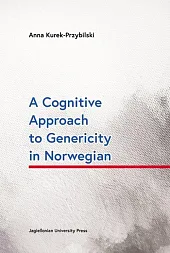A Cognitive Approach to Genericity in Norwegian
A Cognitive Approach to Genericity in Norwegian
Opis publikacji
How does one speak about kinds in Norwegian? Which noun form should one use to say that dogs bark and cows are mammals? And is it always necessary to use a plural noun form to express genericity? The study presented in this book shows a cognitive approach to genericity in Norwegian. The study material includes three data sets—two surveys and a specialised corpus of generic texts. Both the surveys and the corpus were analysed in two ways—with the use of chosen cognitive models and with a number of statistical tests. Applying both qualitative and quantitive methods has allowed to conduct a comprehensive study on genericity in Norwegian. „The study of Anna Kurek-Przybilski is a comprehensive analysis of genericity in Norwegian. The cognitive approach of the project is combined with other analysis models and the results of statistical tests. The cognitive perspective on generics proposed (and conducted) in the project allows for an interesting analysis of language da...
How does one speak about kinds in Norwegian? Which noun form should one use to say that dogs bark and cows are mammals? And is it always necessary to use a plural noun form to express genericity? The study presented in this book shows a cognitive approach to genericity in Norwegian. The study material includes three data sets—two surveys and a specialised corpus of generic texts. Both the surveys and the corpus were analysed in two ways—with the use of chosen cognitive models and with a number of statistical tests. Applying both qualitative and quantitive methods has allowed to conduct a comprehensive study on genericity in Norwegian. „The study of Anna Kurek-Przybilski is a comprehensive analysis of genericity in Norwegian. The cognitive approach of the project is combined with other analysis models and the results of statistical tests. The cognitive perspective on generics proposed (and conducted) in the project allows for an interesting analysis of language data, which is additionally supported by the statistical analyses. The study conducted in the project is based on a comprehensive data set. An advantage of the study is that the chosen data focuses on the actual language use and language intuitions, collected through surveys and provided by carefully chosen respondents—native speakers of Norwegian. Moreover, the analyses were based on a set of generic texts chosen particularly for this purpose. The specialised corpus created by the Author was very deliberate, both in terms of text genres (encyclopaedic texts) and the classification of the texts. As a result, the Author was able to use the models proposed by Radden and Radden and Driven, and develop them further to suit the Norwegian language, taking into account its specificity.” From the review by Prof. Agnieszka Gicala



